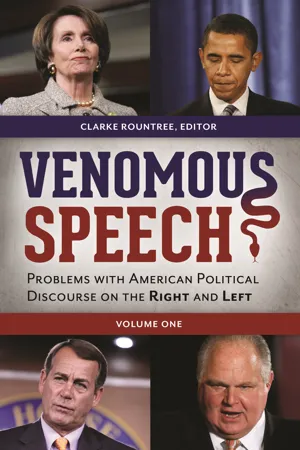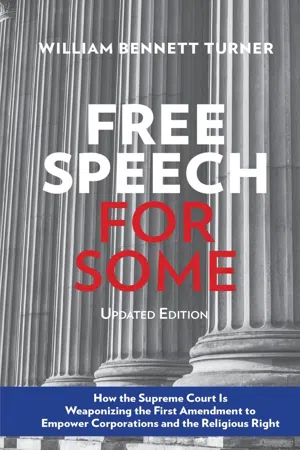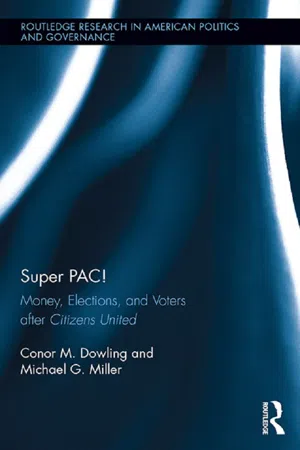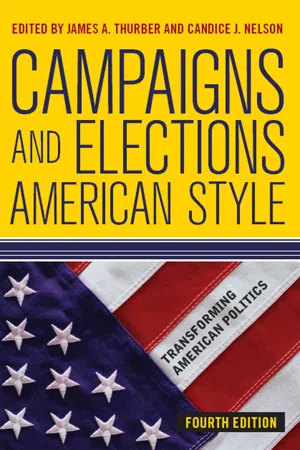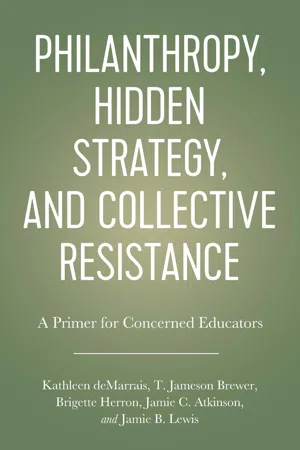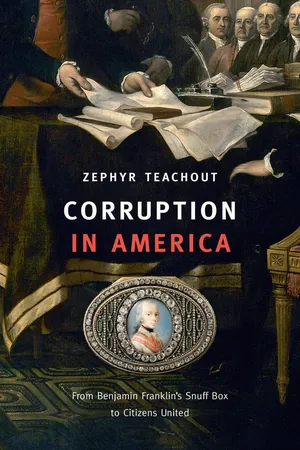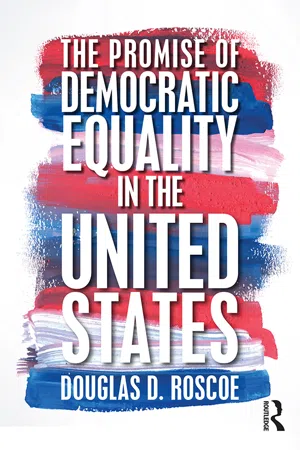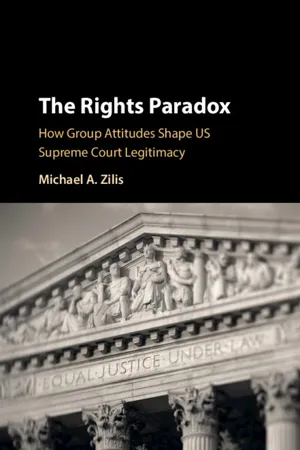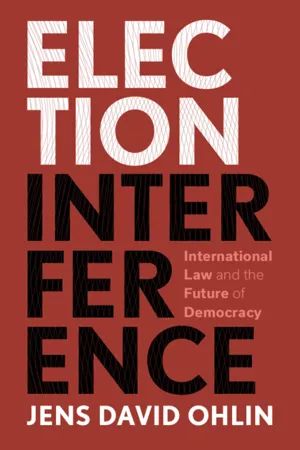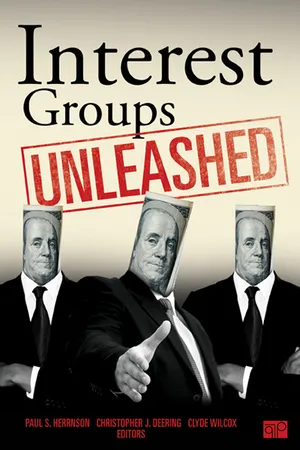Politics & International Relations
Citizens United v FEC
"Citizens United v. FEC" was a landmark 2010 Supreme Court case that ruled in favor of unlimited corporate and union spending on political campaigns. The decision held that political spending is a form of protected speech under the First Amendment, leading to the rise of super PACs and increased influence of money in politics. This decision has had a significant impact on campaign finance laws and political advertising.
Written by Perlego with AI-assistance
Related key terms
1 of 5
10 Key excerpts on "Citizens United v FEC"
- eBook - ePub
Venomous Speech
Problems with American Political Discourse on the Right and Left [2 volumes]
- Clarke Rountree(Author)
- 2013(Publication Date)
- Praeger(Publisher)
CHAPTER 8 Citizens Undone: Freedom of Speech, Political Discourse, and the Import of Citizens United v. Federal Election Commission Stephen A. Smith University of Arkansas On January 21, 2010, the U.S. Supreme Court handed down its decision in Citizens United v. Federal Election Commission, 1 striking down Section 203 of the McCain–Feingold Bipartisan Campaign Reform Act of 2002 as an unconstitutional infringement on the First Amendment rights of corporations and unions to use their general treasury funds to make independent expenditures for electioneering communication or for speech that expressly advocates the election or defeat of a candidate. But it did much more than that. It also launched a vigorous debate that involved all three branches of the federal government, state courts struggling with federalism, voluminous views in law reviews and the popular press, and citizen groups demanding amendments to the U.S. Constitution. While the decision certainly enlivened contemporary political discourse, it also raised serious questions about the efficacy of individual citizens in a republic dominated by unlimited corporate spending to affect electoral outcomes. Citizens United was the most controversial 5–4 decision of the Court in the decade since Bush v. Gore, the case ending the contested presidential election, and it was arguably the most counter-majoritarian opinion of the last two decades. 2 This chapter summarizes the Court’s decision, provides a historical and rhetorical critique of the majority opinion, examines the ensuing political controversy, and discusses the effect of the ruling on political advertising in the 2010 and 2012 elections - eBook - ePub
- William Bennett Turner(Author)
- 2020(Publication Date)
- William Bennett Turner(Publisher)
1 CITIZENS UNITED Corporate Money Talks Citizens United v. Federal Election Commission 1 is the Roberts Court’s most important First Amendment decision. It is also the most misunderstood (partly because the opinions in the case run to 176 pages, and few people have read them). It freed corporations to spend without limit to support or oppose candidates for political office. The Citizens United decision is in many ways the best example of what the Roberts Court has been doing with the First Amendment: • It was a 5–4 decision, with the justices divided along familiar conservative-liberal lines according to the party of the president who appointed them. • The majority opinion was written by Justice Anthony Kennedy, the court’s most enthusiastic First Amendment supporter and the author of several of its most important free speech decisions. • The result strongly advanced corporate and conservative political interests. • Abandoning any commitment to judicial restraint, the court converted a narrow dispute into a major change in American law, overruled a long-standing precedent to arrive at the desired result, and delivered the broadest ruling imaginable. • The court aggressively employed merciless, unforgiving scrutiny to the justifications offered by the government for restricting corporate spending. • The decision had significant real-world consequences, greatly increasing the amount of money spent on political campaigns and creating new sources for campaign funding. Its reasoning led almost immediately to the creation of super PACs (political action committees). Although the court did not actually say, “money is speech,” it held that “independent expenditures”—spending on elections not coordinated with a candidate—are incapable of causing corruption, are treated as “speech,” and are therefore protected by the First Amendment - eBook - ePub
Super PAC!
Money, Elections, and Voters after Citizens United
- Conor M. Dowling, Michael G. Miller(Authors)
- 2014(Publication Date)
- Routledge(Publisher)
Citizens United v. FEC would consume two oral arguments, and would attract briefs from more than three dozen outside parties. The Supreme Court’s opinion in the case would ultimately spark a visible public debate involving even the president of the United States, and would lay the groundwork for a fundamental shift in the conduct of American elections.Citizens United got its day in court on March 24, 2009. Its counsel, Theodore Olson, got straight to the point in arguing that byzantine federal campaign finance rules were infringing on the First Amendment rights of citizens and groups alike. Freedom of speech, he said, was “being smothered by one of the most complicated, expensive, and incomprehensible regulatory regimes ever invented by the administrative state.” Olson argued that it was unfair to exempt media corporations (whose primary focus was disseminating information) from penalty while punishing a group like Citizens United, which had done nothing more than create a film that was “the very definition of robust, uninhibited debate about a subject of intense political interest that the First Amendment is there to guarantee.”The justices immediately seized on Citizens United’s corporate status. The first question, from Justice Souter, was whether Citizens United would hold the same position if Hillary: The Movie had been released by General Motors. In effect, Souter was asking the group to clarify what it wanted the Court to do. He wondered whether Citizens United was suggesting that all corporations be allowed to spend money during elections, or whether the group’s position was that there was something about the film itself that warranted exemption. Olson’s answers suggested the latter. He said that since the film “informs and educates” over the course of its 90 minutes, it was not the sort of material that Congress had intended to ban in the BCRA. Indeed, Olson’s position was that Hillary: The Movie was precisely the sort of communication that the Court had exempted in the WRTL - eBook - ePub
- James A Thurber(Author)
- 2018(Publication Date)
- Routledge(Publisher)
Citizens United to include not only the status of the electioneering communication provision, but also the broader question of corporate-funded independent expenditures, the case transformed from addressing the relatively narrow question of whether the electioneering communication provision applied to limited-distribution films, to considering the much broader question of corporate independent expenditures in general. The case, therefore, now had the potential to alter the decades-old ban on corporate spending in elections, in addition to, or maybe even regardless of, the electioneering communication issue. The legal and policy communities immediately took notice both because of the substantive questions involved and because the second round of oral arguments were scheduled for September 2009. Even if an expedited decision was issued as expected, most observers expected that the best-case scenario would be a ruling in the mid- or late fall of 2009—setting the stage for a potentially major change in campaign finance law and practice halfway through the 2010 election cycle.The Decision: A Brief OverviewIn fact, the Citizens United decision didn’t arrive until January 21, 2010. When the Court issued its ruling, it spurred a policy and public debate over campaign finance issues perhaps never before seen in the United States. Citizens United and corporate political spending were suddenly the topic of sustained national news and cultural importance that continue to this day. As this chapter is being written almost three years after Citizens United, the case’s implications are still unfolding—both in terms of campaign practice and public policy.In Citizens United, the Court overruled its previous decisions in McConnell (finding for the constitutionality of the electioneering communication provision generally) and Austin (regarding the government’s ability to restrict independent political speech based on the advertiser’s corporate status), among other points. What does this mean for the more general discussion here of the case’s implications for campaign finance policy and campaign practice? At least three issues in Citizens United are relevant for the policy and political issues discussed in this chapter. First, was Hillary: The Movie an electioneering communication (and, therefore, subject to the hard-money funding and reporting requirements in BCRA)? Second, what did the case mean for the FECA ban on corporate independent expenditures? Third, what were the implications for disclaimers and disclosure—both of which provide regulators and the public with information about funding surrounding expenditures?16 - eBook - ePub
Philanthropy, Hidden Strategy, and Collective Resistance
A Primer for Concerned Educators
- Kathleen deMarrais, T. Jameson Brewer, Jamie C. Atkinson, Brigette A. Herron, Jamie B. Lewis(Authors)
- 2019(Publication Date)
- Myers Education Press(Publisher)
Reynolds v. Sims (1964), the Court articulated the “one person one vote” rule to promote general equality of representation in the political process. But what happens when one person is an average citizen and the other “person” is a wealthy multinational corporation with virtually unlimited funds? It is unlikely that the average citizen could achieve equality of representation in a political system built on competing campaign donations and the purchase of expensive, mass-market media political advertising. This begs the question: what happens to democracy under these circumstances?This chapter reviews Citizens United and its role in further enabling a wealthy corporate oligarchy over citizen democracy in an increasingly divided nation. This chapter includes a brief review of the relevant history of campaign reform law, the majority opinion in Citizens United , the dissenting opinion, and a discussion of related issues.Legal and Legislative HistoryPrior to the 2010 U.S. Supreme Court decision in the Citizens United case, corporations and unions were banned from funding federal campaigns by the Tillman Act (1907) and the Taft-Hartley Act (1947), respectively. One objective behind these bans was to “limit contributions to ensure that wealthy individuals and special interest groups did not have a disproportionate influence on Federal Elections.”1 Recognizing the need for an institutional structure to provide both oversight of and compliance with campaign finance laws, Congress enacted the Federal Election Campaign Act of 1971 (FECA), which granted oversight to the Clerk of the House, the Secretary of the Senate, and the Comptroller General of the United States General Accounting Office. “The FECA, effective April 7, 1972, not only required full reporting of campaign contributions and expenditures, but also limited spending on media advertisements.”2 FECA allowed corporations and unions to create Political Action Committees (PACs), which had the authority to solicit voluntary contributions and use these monies to contribute to federal political campaigns. As the Watergate scandal unfolded, it was disclosed that monies collected by the Committee to Re-elect the President (CRP) had been used to finance the individuals who broke into the Democratic National Party’s headquarters in the Watergate Hotel. This discovery of campaign finance abuse led Congress to act in 1974 to create the Federal Election Commission, an independent body created to ensure compliance with campaign finance laws. The constitutionality of key provisions of the 1974 amendments were challenged by Senator James L. Buckley. However, the court’s decision in Buckley v. Valeo - eBook - PDF
Corruption in America
From Benjamin Franklin’s Snuff Box to Citizens United
- Zephyr Teachout(Author)
- 2014(Publication Date)
- Harvard University Press(Publisher)
• • • Citizens United changed the culture at the same time that it changed the law. It reframed that which was unpatriotic and named it patriotic. Before Citizens United, corporate or individ-ual money could be spent with a good enough lawyer. But after Citizens United v. FEC, unlimited corporate money spent with intent to influence was named, by the U.S. Supreme Court, in-dispensable to the American political conversation. The question “What does corruption mean?” can, at times, sound as amusing and pleasantly philosophical—and perhaps as arcane—as “Whether a Million of Angels may not fit upon a needle’s point?” 27 After Citizens United, the difference that one definition of one word makes became clear. Kennedy’s definition of corruption leads to unlimited corporate spending; the tradi-tional understanding of corruption allows Congress to ban it. John Adams, in correspondence to a friend about the snuff boxes that everyone was receiving from the French government, wrote that “when I was young and addicted to reading I had heard about dancing upon the points of metaphysical needles; but by mixing in the world I had found the points of political needles finer and sharper than the metaphysical ones.” 28 Citizens United ’s metaphysical needles have led, as I discuss later on, to sharp real-world swords. After Citizens United, there is only one kind of thing that is clearly corrupt: openly asking for a deal in exchange for a specific government action. The vast range of inappropriate dependencies and self-serving behavior that made up the web of the world of corruption for the found-ers is gone. It is not merely that the anticorruption value is out-weighed by other values—the due process clause, the First Amendment, and statutory interpretation—it is that it no lon-ger exists. The corruption against which the framers said they must provide, lest “our government will soon be at an end”—that is not a value anymore. 29 citizens united 245 - Douglas D. Roscoe(Author)
- 2018(Publication Date)
- Routledge(Publisher)
Citizens United have been as much about rich individuals as big business. The bottom line is that it is the money behind the speakers, not their corporate form, that makes unrestricted political speech problematic. Corporations can vary greatly in the amount of resources they can amass. The same is true of individuals. Rich corporate executives are just as problematic as powerful corporations when money can be converted to political power. And in this new era of outside spending, it is rich individuals, not corporations, that are providing most of the money.People tend to associate the Citizens United decision with a flood of money from the business community (think about Bernie Sanders’ complaints about “Wall Street”), and to be sure for-profit corporations are putting into elections a lot more money than they did before that case was decided. But Citizens United also enabled the speech of individuals by letting them pool their money together in non-profit corporations that could spend these aggregated sums on electoral speech. Remember, Buckley allowed individuals to spend unlimited quantities on electoral speech, but few people took advantage of this opportunity. After Buckley not many people – even the very rich – had an interest in independently producing television ads to support candidates and then funding those ads all on their own. But Citizens United has made it possible for these people to set up non-profits, such as Super PACs or 501c4 groups, that can pool their money, hire the kinds of campaign and production staff necessary to produce good ads, and fund major ad purchases that will potentially influence election outcomes. The independent expenditures are, technically, corporate independent expenditures, but they are not coming from the general treasuries of businesses. It is mainly rich people, not businesses, that are fueling the growth of outside spending.Consider the Super PAC universe in the 2012 election cycle. There were 1,842 organizations (including business corporations, unions, and other non-profits) that contributed to Super PACs, and they gave a total of $263 million.6 But there were 19,644 individual contributors to Super PACs, and they gave a total of $509 million – two-thirds of the total amount collected by Super PACs.7 A similar pattern was evident in the 2014 midterm elections, with individual contributions amounting to 61% of the total Super PAC haul.8 Some of these individuals gave astounding amounts of money to Super PACs. Consider the top five individuals contributing to Super PACs in 2012, presented in Table 6.2- eBook - PDF
The Rights Paradox
How Group Attitudes Shape US Supreme Court Legitimacy
- Michael A. Zilis(Author)
- 2021(Publication Date)
- Cambridge University Press(Publisher)
4 Opening the Floodgates Big Business, Citizens United, and Evaluations of the Court The Constitution protects a diverse array of groups. The Framers viewed political and religious minorities as particularly worthy of safeguard, and later developments brought racial groups, women, and the poor into this fold. Yet, a separate strain in American political and jurisprudential thought has carved out a place for others, including those that inherently wield a measure of advantage. No less a constitutional thinker than James Madison emphasized the import- ance of protecting the rights of the wealthy. “The minority of the opulent,” Madison argued, must be protected from majority domination (quoted in Matthews 2005, 54). The Supreme Court has endorsed the view that the Constitution secures the fundamental rights of wealthy and powerful entities. Most prominently, in Citizens United v. Federal Election Commission (2010), the Court determined that the First Amendment’s free speech clause prohibited Congress from restricting expenditures by corporations in candidate elections. The ruling prompted vigorous criticism. Justice Ruth Bader Ginsburg called it the worst decision the modern Court has produced. President Obama argued that the ruling “reversed a century of law” and “will open the floodgates for foreign interests.” Chief Justice John Roberts worried about the impact of this criticism on Court legitimacy (Totenberg 2010). Surveys demonstrated that nearly 80% of Americans opposed the ruling, both in its immediate aftermath (Eggen 2010) and years later (Stohr 2015). This chapter applies the group antipathy model to understand evaluations of the Supreme Court in the post–Citizens United era. This context is distinct from that of the previous chapter, which involved groups that Americans generally perceive as disadvantaged. Yet, the group antipathy model suggests that similar dynamics should guide attitudes toward the judiciary after Citizens United. - eBook - PDF
Election Interference
International Law and the Future of Democracy
- Jens David Ohlin(Author)
- 2020(Publication Date)
- Cambridge University Press(Publisher)
For a good discussion, see Kevin R. Huguelet, Death by A Thousand Cuts: How the Supreme Court Has Effectively Killed Campaign Finance Regulation by Its Limited Recognition of Compelling State Interests, 70 U. MIAMI L. REV. 348, 357 (2015). 37 See Richard L. Hasen, Citizens United and the Orphaned Antidistortion Rationale, 27 GA. ST. U. L. REV. 989, 1002 (2011). 38 See Citizens United v. Fed. Election Comm’n, 558 U.S. 310, 448 (2010) (Stevens, J., dissenting) (“Corruption operates along a spectrum, and the majority’s apparent belief that quid pro quo arrangements can be neatly demarcated from other improper influences does not accord with the theory or reality of politics.”). 2. Prohibition on Foreign Contributions and Spending 129 elections are designed for insiders of a political community to decide their own destiny. In this era of internet technology, the significance of foreign election spending has increased. In the past, problematic foreign spending might have included a foreigner purchasing television or radio advertisements – a costly exercise. Less expensive foreign expenditures would have had little effect. In today’s world, how- ever, the “cost” of speech has radically declined. 39 With a relatively modest outlay of cash, a foreigner can build a social media presence that has a huge impact. A small number of dedicated employees who understand the mechanics of social media can introduce and amplify whatever narratives the purchaser wishes to promote. Furthermore, skillful use of algorithms and software solutions would allow the purchaser to engage in speech, or amplify a message on social media, with relatively few (or even no) employees. The result of these force multipliers is that the barriers for entry have been reduced and the possible frequency and impact of foreign electioneering has radically increased. - eBook - PDF
- Paul S. Herrnson, Christopher J. Deering, Clyde Wilcox, Paul S. Herrnson, Stacey L. Joyner, Clyde Wilcox(Authors)
- 2012(Publication Date)
- CQ Press(Publisher)
The third major change required all voter registration drives conducted during the last 120 days of a federal election that mention a federal candidate be financed with federally regulated funds. Among other things, the law 1 2 paul s. herrnson also increased the limits for contributions to parties to partially compensate for the ban on party soft money. 9 Despite its modest provisions, opponents of the BCRA began preparing to mount legal challenges while the bill was still being debated in Congress. During his filibuster against the law, Sen. Mitch McConnell (R-Ky.), stated, “Should the bill become law, I will be the lead plaintiff.” 10 True to his word, McConnell was a party to the first court challenge to the BCRA. In 2003, in McConnell v. FEC , the court upheld most of the law, but over-turned some provisions, including one prohibiting political parties from making both coordinated and independent expenditures. Four years later, in FEC v. Wisconsin Right to Life, Inc., the Court dealt the BCRA a serious blow when it ruled unconstitutional the BCRA’s disclosure requirements for electioneering communications. This freed corporations, unions, and other groups to broadcast these ads without disclosing their funding sources throughout the duration of an entire primary and general election cycle. In January 2010, in Citizens United v. FEC , the Court ruled on the issue of whether a partisan documentary ( Hillary the Movie ) financed by corporate money was prohibited under federal law. In this sweeping and highly controversial decision, the Court struck down the provisions of the law prohibiting corporations, unions, and other groups from spending general treasury funds to expressly advocate the election or defeat of a federal candidate. Almost as significant as the substance of the ruling was its impact on corporations, unions, and other groups that had previously been hesitant to spend general treasury funds in federal elections.
Index pages curate the most relevant extracts from our library of academic textbooks. They’ve been created using an in-house natural language model (NLM), each adding context and meaning to key research topics.
